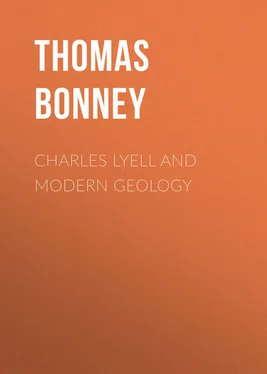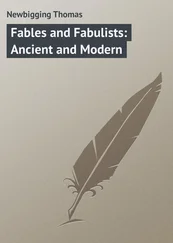Thomas Bonney - Charles Lyell and Modern Geology
Здесь есть возможность читать онлайн «Thomas Bonney - Charles Lyell and Modern Geology» — ознакомительный отрывок электронной книги совершенно бесплатно, а после прочтения отрывка купить полную версию. В некоторых случаях можно слушать аудио, скачать через торрент в формате fb2 и присутствует краткое содержание. ISBN: , Жанр: foreign_antique, foreign_prose, на английском языке. Описание произведения, (предисловие) а так же отзывы посетителей доступны на портале библиотеки ЛибКат.
- Название:Charles Lyell and Modern Geology
- Автор:
- Жанр:
- Год:неизвестен
- ISBN:http://www.gutenberg.org/ebooks/34502
- Рейтинг книги:5 / 5. Голосов: 1
-
Избранное:Добавить в избранное
- Отзывы:
-
Ваша оценка:
- 100
- 1
- 2
- 3
- 4
- 5
Charles Lyell and Modern Geology: краткое содержание, описание и аннотация
Предлагаем к чтению аннотацию, описание, краткое содержание или предисловие (зависит от того, что написал сам автор книги «Charles Lyell and Modern Geology»). Если вы не нашли необходимую информацию о книге — напишите в комментариях, мы постараемся отыскать её.
Charles Lyell and Modern Geology — читать онлайн ознакомительный отрывок
Ниже представлен текст книги, разбитый по страницам. Система сохранения места последней прочитанной страницы, позволяет с удобством читать онлайн бесплатно книгу «Charles Lyell and Modern Geology», без необходимости каждый раз заново искать на чём Вы остановились. Поставьте закладку, и сможете в любой момент перейти на страницу, на которой закончили чтение.
Интервал:
Закладка:
At Chamouni, Lyell made the most of his time, for in three days he walked up to the Col de Balme, climbed the Brévent, and made his first glacier expedition, to the well-known oasis among the great fields of snow and ice which is called the Jardin. Everywhere he notes the flowers, which at that season were in full beauty; and the insects, capturing "no less than seven specimens of that rare insect, Papilio Apollo ." 7 7 Now generally called Parnassius Apollo; but very likely he captured more than one species of the genus.
He feels all the surprise and all the delight which thrills the entomologist from the British Isles when he first sets foot on the slopes of the higher Alps, and sees in abundance the rarities of his own country, besides not a few new species. But Lyell does not neglect the rocks and minerals, or the red snow, or the wonders of the ice world. Chamouni, we are told, was then "perfectly inundated with English," for fifty arrived in one day. The previous year they had numbered one thousand out of a total of fourteen hundred visitors. Since then, times and the village have changed.
Returning to Geneva, the party travelled by Lausanne and Neuchâtel to Bâle, and then followed the picturesque route along the river, by the tumultuous rapids of Laufenburg and the grand falls of the Rhine, to Schaffhausen, whence they turned off to Zurich. Here he writes of the principal inn that it "partook more than any of a fault too common in Switzerland. They have their stables and cow-houses under the same roof, and the unavoidable consequences may be conceived, till they can fall in with a man as able – as 'Hercules to cleanse a stable.'"
From Zurich they crossed the Albis to Zug. The other members of the party went direct to Lucerne, but Lyell turned aside to visit the spot where twelve years previously an enormous mass of pudding-stone had come crashing down from the Rossberg, had destroyed the village of Goldau, and had converted a great tract of fertile land into a wilderness of broken rock. He diagnosed correctly the cause of the catastrophe, and then ascended the Rigi. Here he spent a flea-bitten night at the Kulm Hotel, but was rewarded by a fine sunset and a yet finer sunrise.
At Lucerne he rejoined his relatives, and they drove together over the Brünig Pass to Meyringen. From this place they made an excursion to the Giessbach Falls, and saw the Alpbach in flood after a downpour of rain. This, like some other Alpine streams, becomes at such times a raging mass of liquid mud and shattered slate, and Lyell carefully notes the action of the torrent under these novel circumstances, and its increased power of transport. Parting from his relatives at the Handeck Falls, he walked up the valley of the Aar to the Grimsel Hospice, where he passed the night, and the next morning crossed over into the valley of the Rhone to the foot of its glacier, and then walked back again to Meyringen. He remarks that on the way to the Hospice "we passed some extraordinary large bare planks of granite rock above our track, the appearance of which I could not account for." This is not surprising, for he had not yet learnt to read the "handwriting on the wall" of a vanished glacier. Its interpretation was not to come for another twenty years, when these would be recognised as perhaps the finest examples of ice-worn rocks in Switzerland. Lyell was evidently a good pedestrian; for the very next day he walked from Meyringen over the two Scheideggs to Lauterbrunnen, ultimately joining his relatives at Thun, from which town they went on to Berne, where they were so fortunate as to see, from the well-known terrace, the snowy peaks of the Oberland in all the beauty of the sunset glow.
Then they journeyed over the pleasant uplands to Vevay, and so by the shore of the Lake of Geneva and the plain of the Rhone valley to Martigny, turning aside to visit the salt mines near Bex. They reached Martigny a little more than seven weeks after the lake, formed in the valley of the Dranse by the forward movement of the Giétroz Glacier, had burst its icy barrier, and they saw everywhere the ruins left by the rush of the flood. The road as they approached Martigny was even then, in some places, under water; in others it was completely buried beneath sand. The lower storey of the hotel had been filled with mud and débris, which was still piled up to the courtyard. Lyell went up the valley of the Dranse to the scene of the catastrophe, and wrote in his journal an interesting description of both the effects of the flood and the remnants of the ice-barrier. Before returning to Martigny he also walked up to the Hospice on the Great St. Bernard, and then the whole party crossed by the Simplon Pass into Italy, following the accustomed route and visiting the usual sights till they arrived at Milan.
The next stage on their tour – and this must have been in those days a little tedious – brought them to Venice. The Campanile Lyell does not greatly admire, and of St. Mark's he says rather oddly, "The form is very cheerful and gay"; but on the whole he is much impressed with the buildings of Venice, and especially with the pictures. On their return they went to Bologna, and then crossed the Apennines to Florence. Everywhere little touches in the diary indicate a mind exceptionally observant – such as notes on the first firefly, the fields of millet, the festooned vines seen on the plain, or the peculiar sandy zone on the northern slopes of the hills. He also mentions that shortly after crossing the frontier of Tuscany they passed near Coviliajo, "a volcanic fire" which proceeded from a neighbouring mountain. 8 8 Probably it was a bituminous shale which had become ignited, as was the case at Ringstead Bay, Dorset, with the Kimeridge clay. The same often happens with the "banks" of coal-pits.
This they intended to visit on their return. But at Florence the diary ends abruptly, for the note-book which contained the rest of it was unfortunately lost.
We have given this summary of Lyell's journal in some detail, but even thus it barely suffices to convey an adequate idea of the cultured tastes, wide interests, and habits of close and accurate observation disclosed by its pages. It shows, better perhaps than any other documents, the mental development of the future author of the "Principles of Geology." Few things, as he journeys, escape his notice; he describes facts carefully and speculates but little. As he wanders among the Alpine peaks, he makes no reference to convulsions of the earth's crust; as he views the ruin wrought by the Dranse, he says naught of deluges.
The travellers got back to England in September, and at the end of the Long Vacation Lyell returned to Oxford. There he remained till December, 1819, when he proceeded to the degree of Bachelor of Arts, obtaining a second class in Classical Honours. Considering that he had never been a "hard reader," and that he appears to have spent much of his "longs" in travel – a practice which, though good for general education, counts for little in the schools – the position indicates that he possessed rather exceptional abilities and a good amount of scholarship. Though Oxford had been unable to bestow upon him a systematic training in science, she had given a definite bias to his inclination, and had fostered and cultivated a taste for literature which in the future brought forth a rich fruitage.
CHAPTER III.
THE GROWTH OF A PURPOSE
Shortly after he had donned the bachelor's hood Lyell came to London, was entered at Lincoln's Inn, and studied law in the office of a special pleader. Science was not forsaken, for in March, 1819, he was elected a Fellow of the Geological Society, and about the same time joined the Linnean Society. Before very long his legal studies were interrupted. His eyes became so weak that a complete rest was prescribed; accordingly, in the autumn of 1820, he accompanied his father on a journey to Rome. During this but little was done in geology, for the travellers spent almost all their time in towns.
Читать дальшеИнтервал:
Закладка:
Похожие книги на «Charles Lyell and Modern Geology»
Представляем Вашему вниманию похожие книги на «Charles Lyell and Modern Geology» списком для выбора. Мы отобрали схожую по названию и смыслу литературу в надежде предоставить читателям больше вариантов отыскать новые, интересные, ещё непрочитанные произведения.
Обсуждение, отзывы о книге «Charles Lyell and Modern Geology» и просто собственные мнения читателей. Оставьте ваши комментарии, напишите, что Вы думаете о произведении, его смысле или главных героях. Укажите что конкретно понравилось, а что нет, и почему Вы так считаете.












